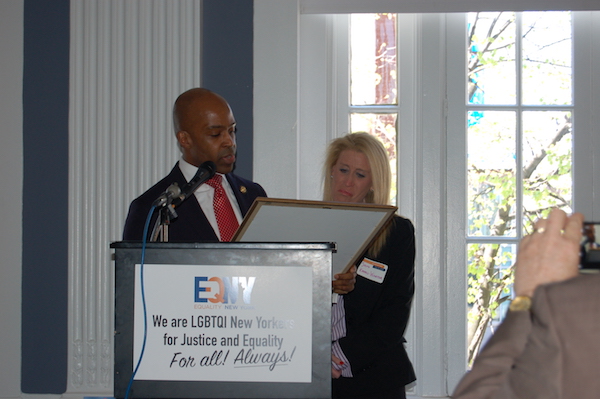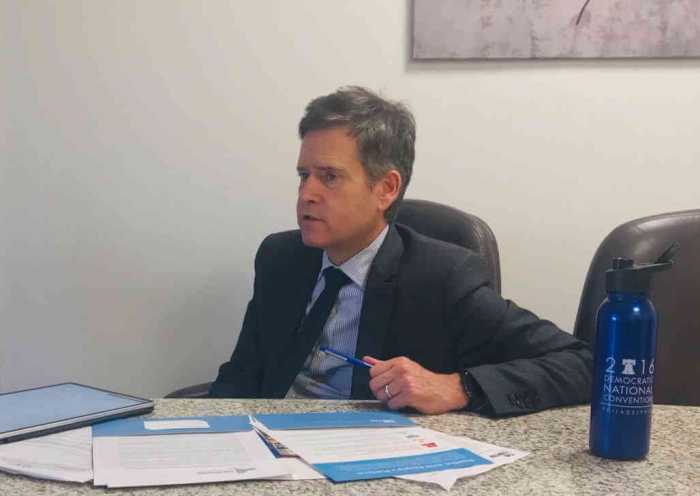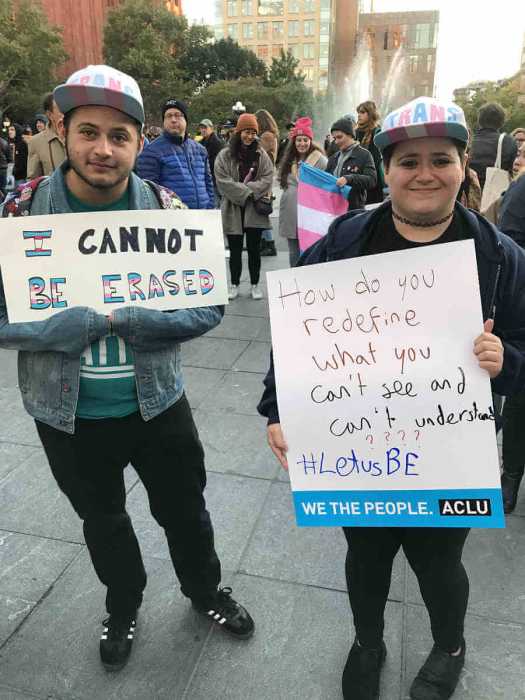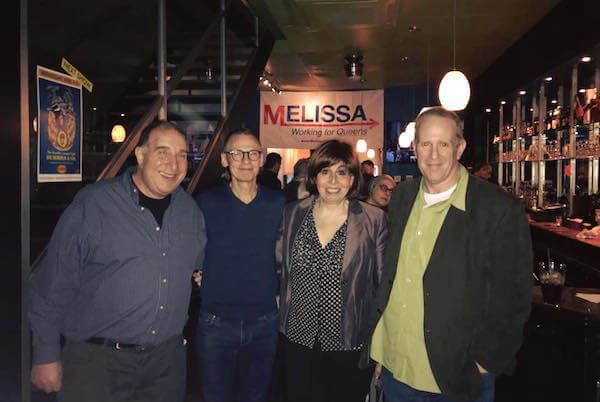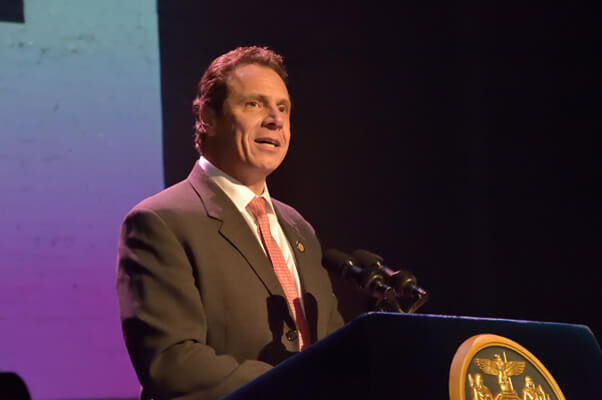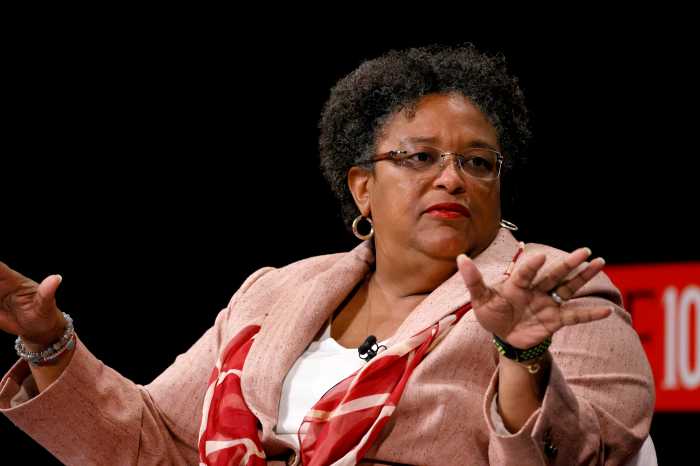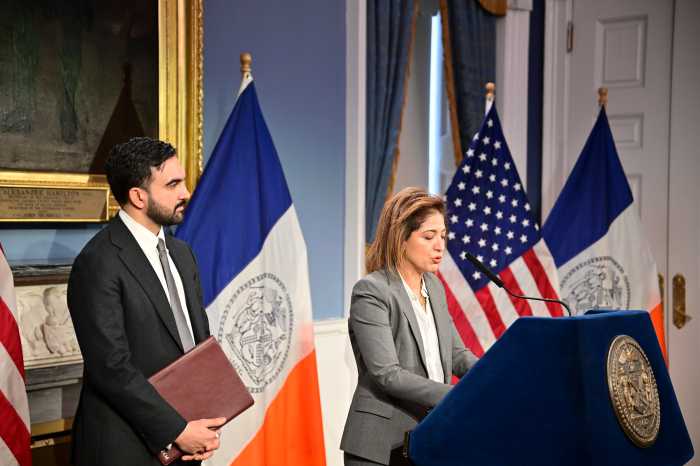Gabriel Blau, Ari Moore, Juli Grey-Owens, and Manhattan Assemblymember Rebecca Seawright addressed a crowd on Advocacy Day in Albany May 8. | COURTESY OF EQNY
Armed with a new, detailed, seven-page State Legislative Platform — which out gay Manhattan State Senator Brad Hoylman admiringly termed the “new LGBTQI agenda for New York State” — roughly 250 activists from across the state traveled to Albany on May 8 for an Advocacy Day aimed at winning legislative support for long-stalled measures addressing a wide array of community needs.
The day was organized by Equality New York, a nearly entirely volunteer group working to provide cohesion among and support for advocacy, service, and community organizations large and small statewide. EQNY grew up in the wake of the Empire State Pride Agenda’s abrupt shuttering in late 2015.
EQNY’s efforts, though still nascent, have won wide praise — from Western New York Democrats, including Bryan Ball; transgender leaders such as Sean Coleman in the South Bronx, retired Buffalo police officer Ari Moore, Manhattan’s Mel Wymore, Long Island’s Juli Grey-Owens, Westchester attorney Kristen Browde, and the Audre Lorde Project; immigration advocates including attorney Luis Fernando Mancheno and Make the Road NY; youth and senior advocates such as the Ali Forney Center and SAGE; and social justice advocates including Clifton Garmon, who in his day job is a policy analyst with VOCAL-NY.
Enormity of the hurdles proved a week later with GENDA’s rejection by the Senate
The activists in Albany also included several parents with transgender children who were organized by PFLAG. Two of them, Manhattanites Judy Sennesh and Robert Johnson, traveled to the Capitol with particular concern about the State Senate’s failure after more than 15 years of advocacy to ever give the Gender Expression Non-Discrimination Act a floor vote.
GENDA, in fact, was the lead focus of the legislative meetings on May 8 — and in a sure sign of the continued obstacles facing that measure, which would add gender identity and expression as protected classes to the State Human Rights Law, as sexual orientation was in 2002, a Senate Committee, just one week later, blocked any further action this session on the bill in a straight party-line vote.
The committee, in fact, only took up the measure at Hoylman’s insistence and then voted it down 5-4. Among the five Republican no votes, Hoylman noted, were three senators from districts where Democrats could win — Andrew Lanza from Staten Island, Elaine Phillips from Nassau County, and Terrence Murphy from Westchester County. The unwillingness of GOP senators from such potential swing districts to give GENDA a vote, in Hoylman’s view, is a sign that the Republicans who control the Senate have made resistance to the measure a test of party loyalty.
Hoylman has long argued that in the wake of Republican cooperation in delivering four votes in favor marriage equality in 2011, that party has decided to stonewall any further advances for the LGBTQ community. In a written statement, he observed that New Hampshire’s Republican Legislature recently extended civil rights protections to that state’s transgender community, meaning that New York is now the only northeastern state without such statutory protections, even as the Trump administration continues to erode protections for trans people at the federal level. Hoylman pledged to continue his fight for GENDA “in a new State Senate after the midterms.”
Democrats nominally hold 32 seats in the 63-seat Senate, but Brooklyn’s Simcha Felder, an Orthodox Jewish social conservative, caucuses with the GOP, giving that party majority control.
LGBTQ leaders statewide share Hoylman’s assessment that flipping the Senate to Democratic control is a prerequisite for making progress on the new Legislative Platform — GENDA and beyond — and one of the signals coming out of May 8’s Advocacy Day is that the Democrats in the Legislature and the Executive Branch are united in their commitment to the transgender civil rights protections.
Governor Andrew Cuomo, in a far-reaching directive in late 2015, created policy under which the sex non-discrimination provisions of state law are now interpreted to encompass gender identity and expression, meaning that the transgender community has many of the protections that GENDA would deliver, though they remain outside the explicit purview of the State Hate Crimes Law.
In announcing his directive, the governor took pains to emphasize that the move was carried out in a manner that provided more permanence that a simple executive order would, but with the Trump administration having moved, through executive action in the past 16 months, to overturn a wide array of administrative advances in LGBTQ rights — not to mention in women’s and labor rights and environmental protections — afforded under the Obama administration, most transgender leaders are eager to see the protections codified in law here.
Cuomo’s willingness to put weight into that effort was evidenced by the appearance of two key administration players — his out gay counsel, Alphonso David, and Lieutenant Governor Kathleen Hochul — at a morning gathering of activists on hand for Advocacy Day. Earlier this spring, David met with activists affiliated with EQNY to discuss GENDA strategy, and the governor himself, in a subsequent meeting with LGBTQ service providers convened in Albany by Manhattan’s LGBT Community Center, also voiced his support for legislative action on the measure.
Alphonso David, Governor Andrew Cuomo’s out gay counsel, is flanked by Judith Kasen-Windsor as he addresses activists on Advocacy Day. | COURTESY OF EQNY
Advocacy Day participants had the misfortune of arriving in Albany one day after the shocking resignation of Attorney General Eric Schneiderman, and many legislators they hoped to meet with were sequestered in meetings to discuss their potential role in naming a successor. Still Robert Johnson, the father of a 21-year-old transgender man who just graduated from Smith College, said that staff members he met with were all “engaged and polite,” and he was able to meet with his own local assemblymember, out gay Daniel O’Donnell.
“Whenever you talk to politicians, it’s hard to gauge their thinking,” he said of some of his meetings. “Are they just being polite to constituents? The people on our side were clearly on our side. Others were harder to read.”
Asked his reaction to the Senate’s decision a week later to table GENDA for another year, Johnson said, “Once upon a time, it would have made me angry. But I gave up on anger, and have moved from anger to determination. We need to turn the Senate Democratic. I have kids to protect, friends to protect.”
Judy Sennesh, who has a 34-year-old transgender son and, as part of the PFLAG board, has been instrumental in expanding the group’s support for parents and families of transgender people of all ages, said, “Parents are a very powerful voice” in helping legislators understand that trans people are members of many families and deserve the respect anyone’s children would receive. At the same time, she argued, the State Senate is currently controlled by politicians guided by “ignorant” views who “hide behind their own skewed, self-serving idea about God.”
Mentioning Felder by name, Senesh said she wished that more LGBTQ people from Orthodox communities would come forward to put a face on the transgender equality issue.
“When youth speak out,” she said, “I think it’s very important.”
In a written response to the Senate’s tabling of GENDA, EQNY’s co-founder, Gabriel Blau, wrote, “For the past two years, the governor’s regulations have been in place, disproving any notion that protecting trans New Yorkers would somehow impinge on the rights of others. There remains no justifiable excuse for these legislators to oppose protections of trans New Yorkers. All New Yorkers need to realize that our Senate majority simply isn’t interested in protecting all of us even as extending those protections would improve the state’s economic competitiveness, be supported by most New Yorkers, and just be the right thing to do.”

